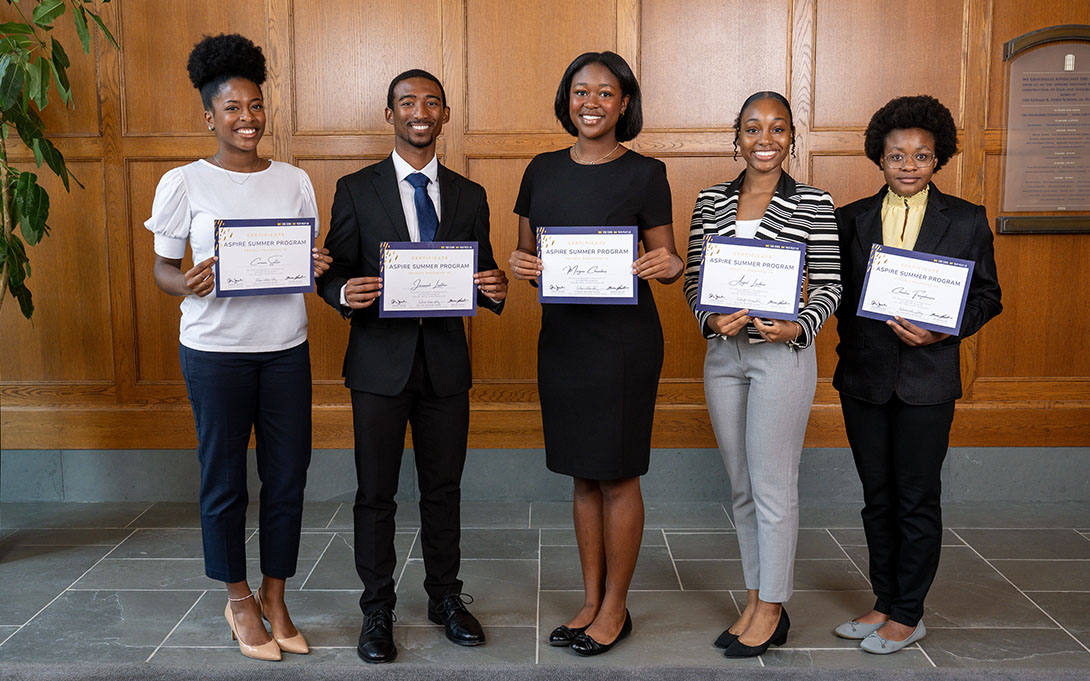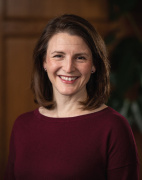
When Chaelee Farquarson learned about the Applied Social Policy Internship and Research Experience (ASPIRE), she applied out of curiosity. As a rising senior studying psychology at Spelman College, much of her research was theoretical.
“I was drawn to the policy aspect of the program because a lot of my undergrad work in psychology focuses on research and analysis but doesn’t apply that research to the real world as much,” Farquarson said. “I saw this program and thought it would be a cool opportunity to see how that might work.”
ASPIRE seemed like the ideal opportunity to bridge that gap. The eight-week program, run by the Youth Policy Lab, a joint program of the Survey Research Center and the Ford School of Public Policy, was founded in 2023 and offers practical experience in applied quantitative social science research to rising college juniors and seniors. Farquarson, along with fellow Spelman and Morehouse students Angel Lindner, Corrine Salter, Morgan Chambers, and Jeremiah Lowther, spent the summer honing their quantitative social science research skills and gaining insights into careers in public policy research.
“This year, in addition to the Spelman women we also welcomed men from Morehouse College to the ASPIRE program. It was wonderful to add men to our mix of students and we are so excited to be strengthening our partnership with both institutions,” said Robin Jacob, faculty co-director and founder of the Youth Policy Lab. “This year we also extended the program from seven to eight weeks, and restructured some of the curriculum to better support our students.”
A cornerstone of the ASPIRE program involves each student developing a unique research project derived from the same data set. This year, project topics ranged from identifying correlations between adverse childhood experiences and depression to the effects of dating violence on the mental health and school engagement of young Black women.
“Every time I leave a workshop or a session with a guest speaker, I feel like my brain has expanded ten times more,” said Morgan Chambers, a rising junior studying psychology at Spelman College. “One of my favorite guest speakers was Luke Shaefer. It was interesting to see that he is such a committed faculty member at the University of Michigan while pursuing other research and policy interests, even on the national level at the White House.”
Angel Lindner, a rising senior studying psychology at Spelman College, echoed Chambers sentiments. “[ASPIRE] has allowed me to be more open-minded,” she explained. “What I want to do is more interdisciplinary than I thought, so realizing that there's several different areas where I can apply my interest in Black maternal health has allowed me to see that the applications are much broader.”
Under the mentorship of a host of University of Michigan affiliates and Youth Policy Lab staff, the students refined their research questions and connected with professionals working at the intersection of policy and research across various sectors.
“All the speakers were amazing,” recounted Corrine Salter, a rising junior studying economics at Spelman College. “Derrick Brooms from Morehouse is from my neighborhood in Chicago and it was special to see someone from my background motivated by education and policy for the same reasons I am."
In addition to meeting with speakers, the students had the opportunity to visit policymaking and philanthropic organizations in Detroit and Ann Arbor.
"We visited the Kellogg Foundation in Detroit, where they told us about their goal of making their services unnecessary,” said Farquarson. “[They explained] we shouldn’t live in a world where we depend on nonprofits for food or clothes, those things should be provided automatically. That was extremely enlightening for me.”
The program culminated in a capstone presentation showcasing the students’ research findings on July 26.
Chambers’ mentor Erykah Benson, a fourth-year PhD candidate in sociology at the University of Michigan, expressed pride in watching the students present their findings. “A highlight of the program is always listening to the student’s final presentations. Seeing how their research questions have developed and understanding the social issues that the students care about is a testament to their dedication and a celebration of their work this summer.”
As the program completes its second year, each student remarked on the welcoming and supportive environment fostered by YPL and the Ford School, crediting staff and mentors for making the experience feel intimate despite the University of Michigan’s status as a large public university.
“Any other internship I do is going to have to step up their game a lot, as far as I’m concerned,” noted Jeremiah Lowther, a rising junior studying sociology at Morehouse College. “I love the flexibility of it. We could be very creative in our research projects and had great guidance while hearing from professionals in the legal, policy, and healthcare spaces.”
About ASPIRE and the Youth Policy Lab
The Applied Social Policy Internship and Research Experience (ASPIRE) is an eight-week summer program to help rising college juniors and seniors develop quantitative social science research skills and a greater understanding about what it would be like to pursue a career in public policy research. The program is managed by the Youth Policy Lab (YPL) at the Gerald R. Ford School of Public Policy and the Institute for Social Research at the University of Michigan.
The Youth Policy Lab employs a team of experienced staff and faculty and engages with experts from across the University of Michigan. YPL partners with public-sector stakeholders to produce actionable insights that help ensure all children thrive, especially those experiencing adverse outcomes due to systemic social and economic barriers.
